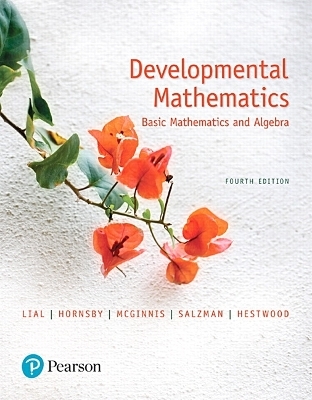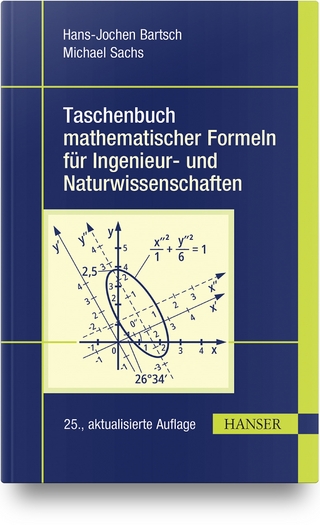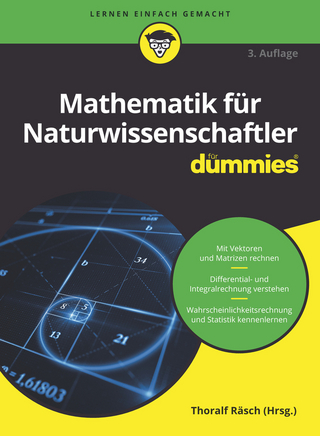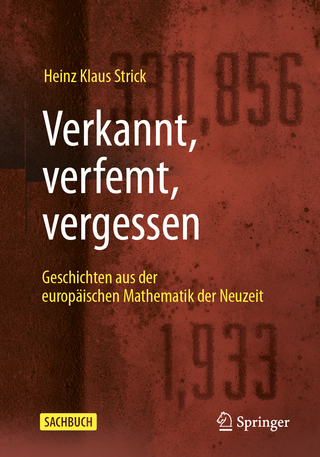
Developmental Mathematics
Pearson (Verlag)
978-0-13-453981-2 (ISBN)
The perfect combination to master concepts: student-friendly writing, well-crafted exercises, and superb support
The Lial Series has helped thousands of students succeed in developmental mathematics by combining clear, concise writing and examples with carefully crafted exercises to support skill development and conceptual understanding. The reader-friendly style delivers help precisely when needed. This revision continues to support students with enhancements in the text and MyLabTM Math course to encourage conceptual understanding beyond skills and procedures. Student-oriented features throughout the text and MyLab Math, including the Relating Concepts exercises, Guided Solutions, Test Your Word Power, and the Lial Video Library, make the Lial series one of the most well-rounded and student-friendly available.
Also available with MyLab Math
MyLabTM Math is an online homework, tutorial, and assessment program designed to work with this text to engage students and improve results. Within its structured environment, students practice what they learn, test their understanding, and pursue a personalized study plan that helps them absorb course material and understand difficult concepts.
Note: You are purchasing a standalone product; MyLabTM Math does not come packaged with this content. Students, if interested in purchasing this title with MyLab Math, ask your instructor for the correct package ISBN and Course ID. Instructors, contact your Pearson representative for more information.
If you would like to purchase both the physical text and MyLab Math, search for:
0134769589 / 9780134769585 Developmental Mathematics: Basic Mathematics and Algebra Plus MyLab Math -- Title-Specific Access Card Package, 4/e
Package consists of:
0134539818 / 9780134539812 Developmental Mathematics: Basic Mathematics and Algebra
0134764854 / 9780134764856 MyLab Math with Pearson eText -- Life of Edition Standalone Access Card -- for Developmental Mathematics
Preface
CHAPTER 1 Whole Numbers
1.1 Reading and Writing Whole Numbers
1.2 Adding Whole Numbers
1.3 Subtracting Whole Numbers
1.4 Multiplying Whole Numbers
1.5 Dividing Whole Numbers
1.6 Long Division
1.7 Rounding Whole Numbers
1.8 Exponents, Roots, and Order of Operations
1.9 Reading Pictographs, Bar Graphs, and Line Graphs
1.10 Solving Application Problems
CHAPTER 2 Multiplying and Dividing Fractions
2.1 Basics of Fractions
2.2 Mixed Numbers
2.3 Factors
2.4 Writing a Fraction in Lowest Terms
2.5 Multiplying Fractions
2.6 Applications of Multiplication
2.7 Dividing Fractions
2.8 Multiplying and Dividing Mixed Numbers
CHAPTER 3 Adding and Subtracting Fractions
3.1 Adding and Subtracting Like Fractions
3.2 Least Common Multiples
3.3 Adding and Subtracting Unlike Fractions
3.4 Adding and Subtracting Mixed Numbers
3.5 Order Relations and the Order of Operations
CHAPTER 4 Decimals
4.1 Reading and Writing Decimal Numbers
4.2 Rounding Decimal Numbers
4.3 Adding and Subtracting Decimal Numbers
4.4 Multiplying Decimal Numbers
4.5 Dividing Decimal Numbers
4.6 Fractions and Decimals
CHAPTER 5 Ratio and Proportion
5.1 Ratios
5.2 Rates
5.3 Proportions
5.4 Solving Proportions
5.5 Solving Application Problems with Proportions
CHAPTER 6 Percent
6.1 Basics of Percent
6.2 Percents and Fractions
6.3 Using the Percent Proportion and Identifying the Components in a Percent Problem
6.4 Using Proportions to Solve Percent Problems
6.5 Using the Percent Equation
6.6 Solving Application Problems with Percent
6.7 Simple Interest
6.8 Compound Interest
CHAPTER 7 Geometry
8.1 Basic Geometric Terms
8.2 Angles and Their Relationships
8.3 Rectangles and Squares
8.4 Parallelograms and Trapezoids
8.5 Triangles
8.6 Circles
8.7 Volume
8.8 Pythagorean Theorem
8.9 Similar Triangles
CHAPTER 8 Statistics
8.1 Circle Graphs
8.2 Bar Graphs and Line Graphs
8.3 Frequency Distributions and Histograms
8.4 Mean, Median, and Mode
CHAPTER 9 The Real Number System
9.1 Exponents, Order of Operations, and Inequality
9.2 Variables, Expressions, and Equations
9.3 Real Numbers and the Number Line
9.4 Adding Real Numbers
9.5 Subtracting Real Numbers
9.6 Multiplying and Dividing Real Numbers
9.7 Properties of Real Numbers
9.8 Simplifying Expressions
CHAPTER 10 Equations, Inequalities, and Applications
10.1 The Addition Property of Equality
10.2 The Multiplication Property of Equality
10.3 More on Solving Linear Equations
10.4 An Introduction to Applications of Linear Equations
10.5 Formulas and Additional Applications from Geometry
10.6 Solving Linear Inequalities
CHAPTER 11 Graphs of Linear Equations and Inequalities in Two Variables
11.1 Linear Equations and Rectangular Coordinates
11.2 Graphing Linear Equations in Two Variables
11.3 The Slope of a Line
11.4 Slope-Intercept Form of a Linear Equation
11.5 Point-Slope Form of a Linear Equation and Modeling
11.6 Graphing Linear Inequalities in Two Variables
CHAPTER 12 Exponents and Polynomials
12.1 The Product Rule and Power Rules for Exponents
12.2 Integer Exponents and the Quotient Rule
12.3 An Application of Exponents: Scientific Notation
12.4 Adding and Subtracting Polynomials
12.5 Multiplying Polynomials
12.6 Special Products
12.7 Dividing a Polynomial by a Monomial
12.8 Dividing a Polynomial by a Polynomial
CHAPTER 13 Factoring and Applications
13.1 Greatest Common Factors; Factor by Grouping
13.2 Factoring Trinomials
13.3 Factoring Trinomials by Grouping
13.4 Factoring Trinomials Using the FOIL Method
13.5 Special Factoring Techniques
13.6 Solving Quadratic Equations Using the Zero-Factor Property
13.7 Applications of Quadratic Equations
CHAPTER 14 Rational Expressions and Applications
14.1 The Fundamental Property of Rational Expressions
14.2 Multiplying and Dividing Rational Expressions
14.3 Least Common Denominators
14.4 Adding and Subtracting Rational Expressions
14.5 Complex Fractions
14.6 Solving Equations with Rational Expressions
14.7 Applications of Rational Expressions
14.8 Variation
CHAPTER 15 Systems of Linear Equations and Inequalities
15.1 Solving Systems of Linear Equations by Graphing
15.2 Solving Systems of Linear Equations by Substitution
15.3 Solving Systems of Linear Equations by Elimination
| Erscheinungsdatum | 04.06.2017 |
|---|---|
| Sprache | englisch |
| Maße | 216 x 274 mm |
| Gewicht | 2418 g |
| Themenwelt | Mathematik / Informatik ► Mathematik ► Allgemeines / Lexika |
| Mathematik / Informatik ► Mathematik ► Algebra | |
| ISBN-10 | 0-13-453981-8 / 0134539818 |
| ISBN-13 | 978-0-13-453981-2 / 9780134539812 |
| Zustand | Neuware |
| Informationen gemäß Produktsicherheitsverordnung (GPSR) | |
| Haben Sie eine Frage zum Produkt? |
aus dem Bereich


